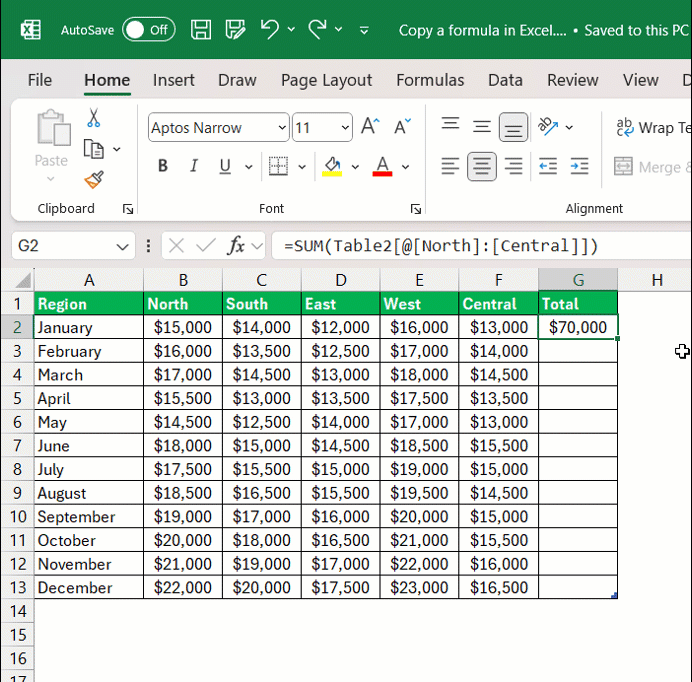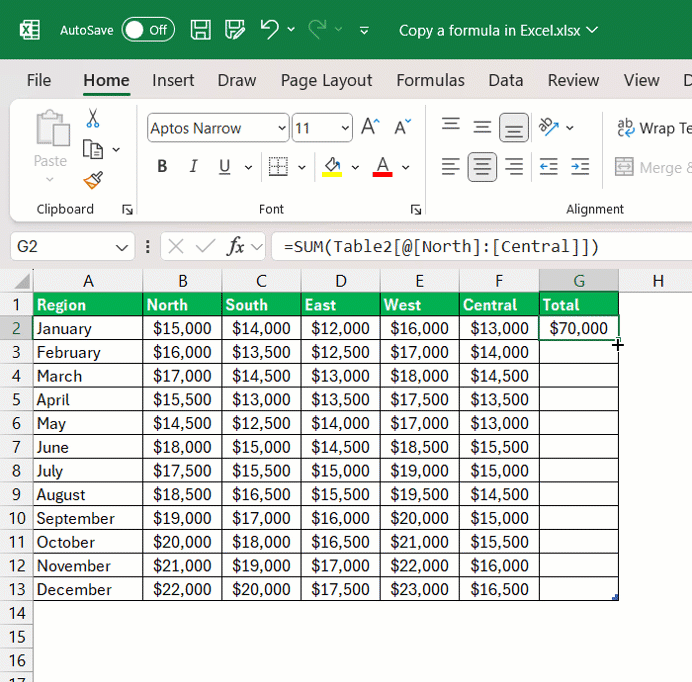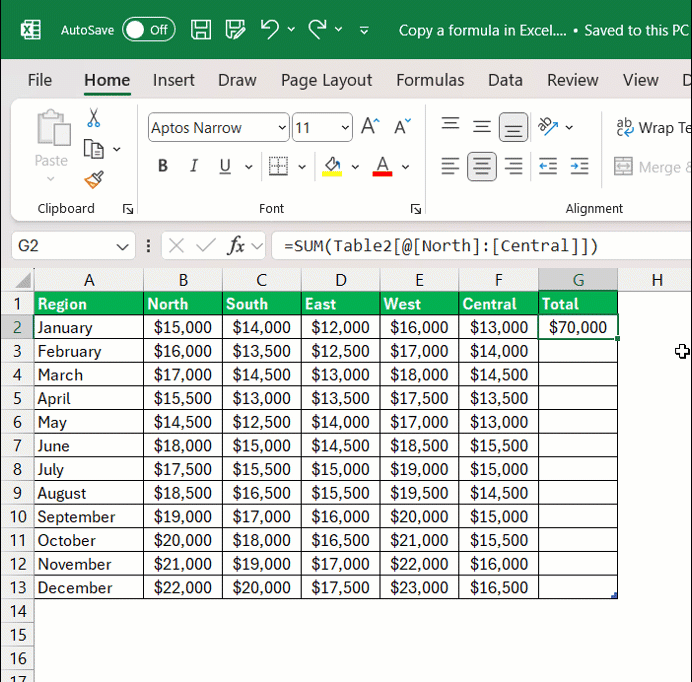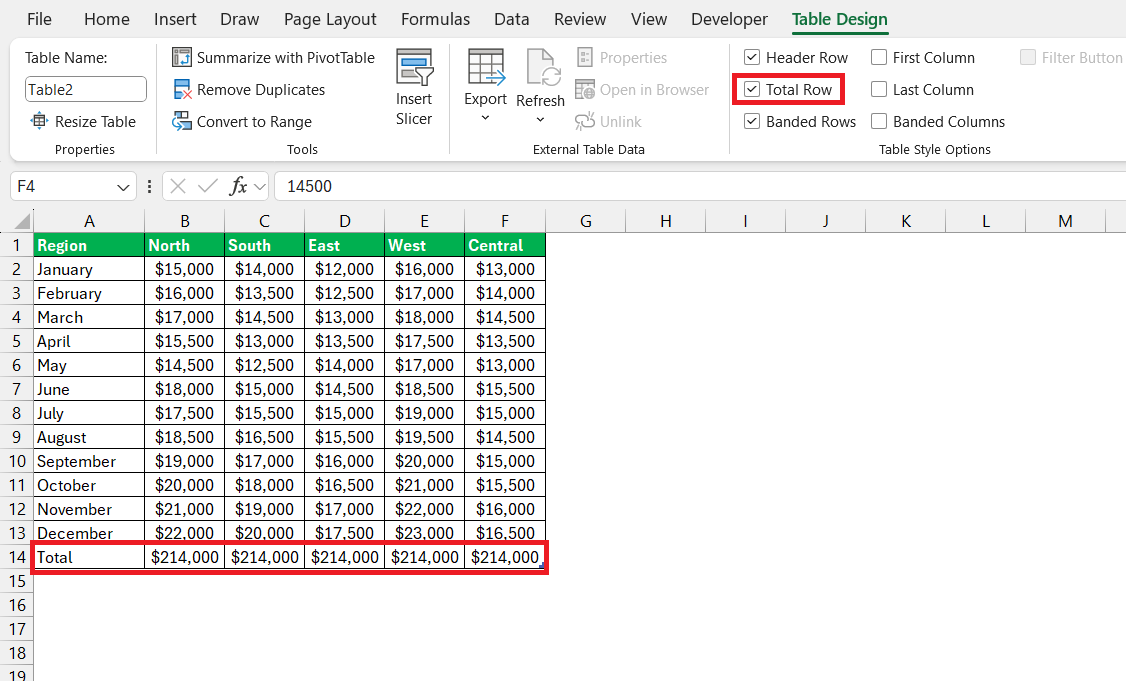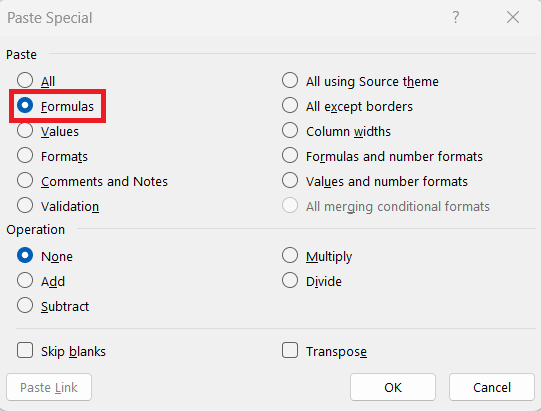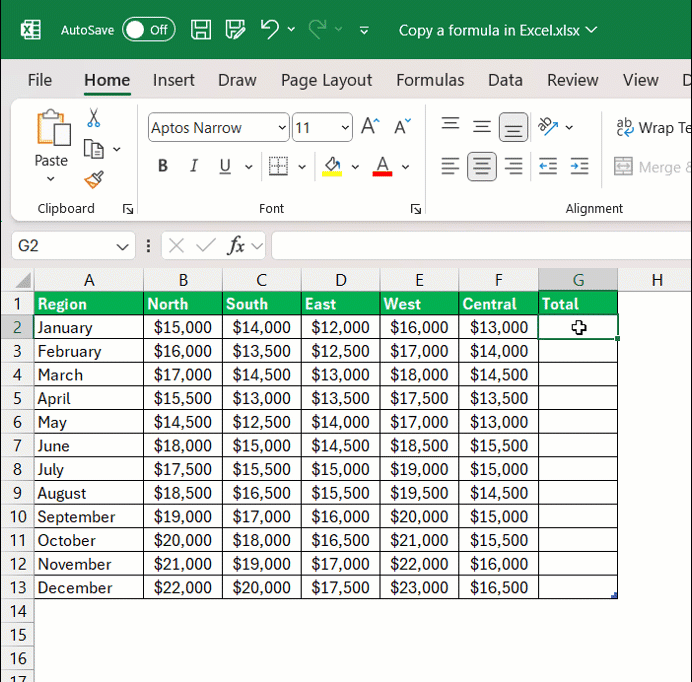When managing multiple tasks in Microsoft Excel, efficient formula copying is essential. It ensures accuracy, consistency, and significant time savings, preventing errors that could lead to miscalculations. This guide will explore key methods and techniques to master the art of copying formulas in Excel effectively.
Key Takeaways:
- Absolute references (
$A$1) stay constant, while relative references (A1) change when copied. - AutoFill automates formula copying by dragging the fill handle, with Excel adjusting references as needed.
- The traditional copy (Ctrl+C) and paste (Ctrl+V) method is reliable and carries over cell formatting.
- Converting a range to an Excel table (Ctrl+T) ensures automatic formula replication and uniformity.
- Use ‘Paste Special’ to keep cell references unchanged, and Ctrl+Enter to apply formulas to non-adjacent cells.
Table of Contents
Excelling at Formulas: The Copying Conundrum
Why Efficient Formula Copying Matters
When you’re juggling multiple tasks in Excel, efficient formula copying isn’t just a convenience—it’s a lifeline. Doing it right ensures the accuracy and consistency of your data, preventing errors that could lead you down a frustrating path of miscalculations. Plus, it’s a real time-saver, and who doesn’t need more time?
Approaching Copying with the Right Mindset
As you approach the task to copy a formula, adopting the right mindset is essential. Think of Excel as a powerful ally in your data management efforts. Instead of laboriously working through each formula, train yourself to seek out patterns and structures that repeat. By embracing best practices from the get-go, you’re not just completing a task; you’re fine-tuning a key skill that will pay dividends in speed and accuracy.
Getting Started with Excel Formulas
Understanding Absolute vs Relative Cell References
Grasping the difference between absolute and mixed cell references in Excel is crucial for efficient formula management. If they understand when to use a dollar sign to lock rows or columns, they can replicate formulas without hiccups.
Remember, an absolute reference—marked with a $ sign—stays put no matter where they copy your formula, while a relative reference moves along with it. This knowledge guards against unintentional changes to your formulas and powers through spreadsheets with confidence.
Fundamentals of Copying Formulas in Excel
Before diving into the deep end, let’s get a handle on the basics. Copying formulas in Excel can be as simple as selecting a cell with a formula you need, hitting Ctrl+C to copy, and Ctrl+V to paste it somewhere else.
Remember, Excel’s intelligence adjusts the formula based on where they paste it. If they crave originality, however, and don’t want Excel to change anything, anchoring the cell reference with those handy dollar signs ($) is the secret to keeping things constant.
Top Techniques for Copying Formulas
AutoFill: Your Formula Copying Friend
AutoFill is akin to a magic wand for Excel enthusiasts—it automates the copying of formulas with sheer elegance. They simply type a formula in one cell, drag the fill handle (that’s the little square in the bottom-right corner of the cell selection) across the cells they need, and voilà!
Excel smartly adjusts the references for each cell. Want to fill down a long list? Double-click that fill handle and watch the formula zip down to the last cell with adjacent data. Now, that’s working smarter, not harder!
Copy and Paste: The Traditional Approach
Sometimes, tradition wins for a reason. The copy and paste method is the old reliable for copying formulas in Excel. They have to click the cell with the formula, use Ctrl+C to copy, then choose the destination cell and hit Ctrl+V to paste.
It’s straightforward and flawless for single instances or non-adjacent cells. Remember, using this method, they also carry over any cell formatting—which could be a bonus or a nuisance.
Using Excel Tables for Seamless Formula Extension
Excel tables are not just for their good looks—their smart formula replication is a standout feature. Once they transform a range into a table (Ctrl + T is your shortcut), you can select the Total Row checkbox in the Table Design tab.
Not only does this save time, it ensures uniformity across their data set. Plus, those formulas stay intact even if they add or remove rows, making it a robust solution for dynamic data management.
Advanced Tips for Specific Scenarios
Copying Formulas Without Altering Cell References
When they need to copy a formula without changing a single cell reference, they can summon the ‘Paste Special’ command to their aid. Instead of the usual Ctrl+C and Ctrl+V, after copying a formula, they’ll choose ‘Paste Special‘ and then ‘Formulas’.
This keeps the references exactly as they are, regardless of where they are passed. It’s like being able to move a piece of a puzzle to a new position without it changing shape—it fits perfectly into its new spot.
Filling Non-Adjacent Cells with Consistent Formulas
To sprinkle the same formula across non-adjacent cells like pixie dust, Excel has a trick up its sleeve. They can select all the cells they wish to fill—pressing and holding Ctrl to choose them individually—then enter the formula in the first cell and, instead of pressing Enter, press Ctrl+Enter.
Excel will copy that formula to all selected cells, a real lifesaver when dealing with scattered data points.T
FAQ: Mastering Formula Copying in Excel
How can I copy a formula without changing its cell references?
To copy a formula without changing its cell references, use the ‘Paste Special‘ feature. After copying the formula (Ctrl+C), choose the destination cell, right-click, select ‘Paste Special’, and click ‘Formulas’. This keeps all cell references exactly as they were in the original formula.
What is the quickest way to copy a formula down an entire column?
The quickest way to copy a formula down an entire column is to double-click the fill handle. After entering the formula in the top cell, simply double-click the small square at the bottom right corner of that cell, and Excel will automatically fill the formula down to the bottom of the contiguous range.
What are the risks of using the dragging method to copy formulas?
Using the dragging method to copy formulas can inadvertently alter the cell formatting or disrupt the integrity of alternate row shading. It also risks incorrect adjustment of relative cell references and could lead to calculation errors if not monitored closely. Over-extending the drag might also apply formulas to unwanted cells, potentially overwriting existing data.
Can I maintain conditional formatting when copying formulas?
Yes, you can maintain conditional formatting when copying formulas by ensuring you use the ‘Paste Special’ option. Copy your formula, then right-click the target cell, go to ‘Paste Special’, and select ‘Formulas’. It copies the formula but leaves the existing conditional formatting in the destination cell unaffected.
How do I apply the same formula to multiple cells in Excel?
To apply the same formula to multiple cells in Excel, select all the target cells, either by dragging through adjacent cells or Ctrl-clicking each cell for non-adjacent ones. Type the formula in the first cell, then press Ctrl+Enter. Excel will place the formula in all selected cells, adjusting relative references as needed. This method works for contiguous and non-contiguous cell ranges.
John Michaloudis is a former accountant and finance analyst at General Electric, a Microsoft MVP since 2020, an Amazon #1 bestselling author of 4 Microsoft Excel books and teacher of Microsoft Excel & Office over at his flagship Academy Online Course.
